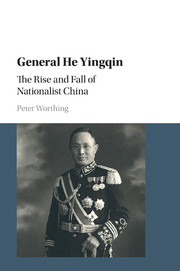Refine search
Actions for selected content:
15418 results in Military history
Copyright page
-
- Book:
- General He Yingqin
- Published online:
- 05 March 2016
- Print publication:
- 29 March 2016, pp iv-iv
-
- Chapter
- Export citation
List of Figures
-
- Book:
- Women Warriors and Wartime Spies of China
- Published online:
- 05 March 2016
- Print publication:
- 29 March 2016, pp viii-viii
-
- Chapter
- Export citation
Bibliography
-
- Book:
- Women Warriors and Wartime Spies of China
- Published online:
- 05 March 2016
- Print publication:
- 29 March 2016, pp 245-266
-
- Chapter
- Export citation
2 - “Like Bao Shuya and Guan Zhong”
-
- Book:
- General He Yingqin
- Published online:
- 05 March 2016
- Print publication:
- 29 March 2016, pp 35-57
-
- Chapter
- Export citation
Introduction: From Conquest to Occupation
-
- Book:
- A History of Military Occupation from 1792 to 1914
- Published by:
- Edinburgh University Press
- Published online:
- 23 September 2017
- Print publication:
- 07 March 2016, pp 1-38
-
- Chapter
- Export citation
Contents
-
- Book:
- A History of Military Occupation from 1792 to 1914
- Published by:
- Edinburgh University Press
- Published online:
- 23 September 2017
- Print publication:
- 07 March 2016, pp v-vi
-
- Chapter
- Export citation
7 - Occupations by the United States of America and the Spanish-American War
-
- Book:
- A History of Military Occupation from 1792 to 1914
- Published by:
- Edinburgh University Press
- Published online:
- 23 September 2017
- Print publication:
- 07 March 2016, pp 287-318
-
- Chapter
- Export citation
4 - The Franco-German War and Occupation of France
-
- Book:
- A History of Military Occupation from 1792 to 1914
- Published by:
- Edinburgh University Press
- Published online:
- 23 September 2017
- Print publication:
- 07 March 2016, pp 188-223
-
- Chapter
- Export citation
Index
-
- Book:
- A History of Military Occupation from 1792 to 1914
- Published by:
- Edinburgh University Press
- Published online:
- 23 September 2017
- Print publication:
- 07 March 2016, pp 347-357
-
- Chapter
- Export citation
Conclusion
-
- Book:
- A History of Military Occupation from 1792 to 1914
- Published by:
- Edinburgh University Press
- Published online:
- 23 September 2017
- Print publication:
- 07 March 2016, pp 319-330
-
- Chapter
- Export citation
Frontmatter
-
- Book:
- A History of Military Occupation from 1792 to 1914
- Published by:
- Edinburgh University Press
- Published online:
- 23 September 2017
- Print publication:
- 07 March 2016, pp i-iv
-
- Chapter
- Export citation
6 - Occupations to the Eve of the First World War
-
- Book:
- A History of Military Occupation from 1792 to 1914
- Published by:
- Edinburgh University Press
- Published online:
- 23 September 2017
- Print publication:
- 07 March 2016, pp 254-286
-
- Chapter
- Export citation
5 - Codification of a Law of Occupation
-
- Book:
- A History of Military Occupation from 1792 to 1914
- Published by:
- Edinburgh University Press
- Published online:
- 23 September 2017
- Print publication:
- 07 March 2016, pp 224-253
-
- Chapter
- Export citation
Select Bibliography
-
- Book:
- A History of Military Occupation from 1792 to 1914
- Published by:
- Edinburgh University Press
- Published online:
- 23 September 2017
- Print publication:
- 07 March 2016, pp 331-346
-
- Chapter
- Export citation
1 - The Era of the French Revolutionary and the Napoleonic Wars
-
- Book:
- A History of Military Occupation from 1792 to 1914
- Published by:
- Edinburgh University Press
- Published online:
- 23 September 2017
- Print publication:
- 07 March 2016, pp 39-103
-
- Chapter
- Export citation
2 - European Occupations before 1870
-
- Book:
- A History of Military Occupation from 1792 to 1914
- Published by:
- Edinburgh University Press
- Published online:
- 23 September 2017
- Print publication:
- 07 March 2016, pp 104-145
-
- Chapter
- Export citation
3 - Military Occupation and America: Expansion and Civil War
-
- Book:
- A History of Military Occupation from 1792 to 1914
- Published by:
- Edinburgh University Press
- Published online:
- 23 September 2017
- Print publication:
- 07 March 2016, pp 146-187
-
- Chapter
- Export citation

Women Warriors and Wartime Spies of China
-
- Published online:
- 05 March 2016
- Print publication:
- 29 March 2016

General He Yingqin
- The Rise and Fall of Nationalist China
-
- Published online:
- 05 March 2016
- Print publication:
- 29 March 2016
8 - The Peloponnesian War and Sparta’s strategic alliances
- from Part II - The political and military challenges of coalition warfare
-
-
- Book:
- Grand Strategy and Military Alliances
- Published online:
- 05 February 2016
- Print publication:
- 09 February 2016, pp 197-215
-
- Chapter
- Export citation
